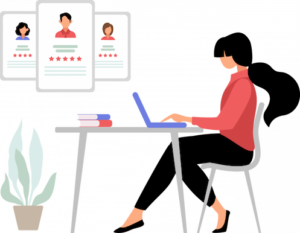The average face-to-face job interview lasts about 40 minutes. That’s right — you typically get less than an hour to sit down with potential new hires, get to know them, and figure out if they’re a good fit for your company.
The key to conducting successful job interviews and choosing the best employees is asking the right questions. Basic queries like “What are your strengths and weaknesses?” simply won’t cut it into today’s competitive hiring world.
Not sure which questions to ask instead? Keep reading.
This article lists the 48 best employer interview questions you can use to find the highest-quality candidates for your business. You’ll also learn about the different categories of interview questions, as well as which interview questions are almost always off-limits.
What Interview Questions Are Off-Limits?
Before we dive into the specific interview questions to ask job candidates, let’s talk about what you shouldn’t ask. You need to make sure that, in your efforts to be creative with your questioning, you don’t violate any laws or ask anything that could make interviewees feel uncomfortable.
The following are some types of questions that are off-limits:
- Questions about an interviewee’s gender, age, race, nationality, religion, marital status, or sexual orientation
- Questions about an interviewee’s children or future children (“Do you have kids?”, “Are you pregnant?”, etc.)
- Questions about an interviewee’s health, medications, or potential disabilities
- Questions about an interviewee’s mental health (this includes asking about specific mental health conditions, medications, previous treatments, etc.)
- Questions about an interviewee’s political beliefs
Remember, your interview questions need to be specific to the job and an interviewee’s ability to carry out the responsibilities associated with that job.
If you’re worried that an employee with children might have a hard time meeting the job requirements, you can’t ask them directly if they have kids or plan to have kids. However, you can ask them if they have other responsibilities that might interfere with their ability to meet the demands of the job.
What Are the Types of Interview Questions?
When deciding what kinds of interview questions to ask job candidates, remember that most questions fall under 4 main categories: Experience-related questions, situational questions, management questions, and technical questions.
Each type of employer interview question is explained in more detail below:
Experience-Related Questions
Experience-related interview questions help you to decide how qualified a candidate is for a particular job opening.
The interviewees’ answers to these questions let you know what kind of education and training they have, as well as how long they’ve worked in the industry, what kinds of positions they’ve held in the past, etc.
Situational Questions
Situational interview questions help you assess how a candidate will handle certain situations at work.
These questions should be relevant to the specific job for which you’re hiring. For example, if you’re hiring a customer service representative, ask questions that help you see how the candidate would respond when met with common customer service-related issues (late delivery, a product exchange, etc.).
Management Questions
Management interview questions provide more insight into a candidate’s management and leadership style. They let you know how that person will manage those below them and what steps they’ll take and strategies they’ll implement to meet business objectives.
These questions can also be combined with the other types of questions discussed above. For example, you can ask questions about the candidate’s previous leadership experience, as well as how they would handle certain leadership-related situations.
Technical Questions
Technical interview questions give you more information about a candidate’s technical knowledge and abilities. This might include their ability to use certain computer programs and apps or write code using a particular coding language.
Technical questions can also overlap with situational questions or experience-related questions.
For example, you can ask which program or process a candidate would use in a specific situation. You could also ask what technical training certifications the candidate has received, as well as what they do to maintain their knowledge in an ever-changing industry.
48 Best Employer Interview Questions to Ask Candidates
Now, let’s get into the best employer interview questions to ask candidates. Outlined below are 48 examples of questions you can ask, divided into the 4 main categories of interview questions:
Top 12 Experience-Related Interview Questions
Ask experience-related questions that help you learn more about the candidate’s training, work history, etc. Some examples include:
- 1. Can you describe the most significant achievement you had in your last job?
- 2. Can you tell me more about this project listed on your resume?
- 3. What did you like the most about your last job?
- 4. What did you like the least about your last job?
- 5. In what ways did your skills grow in your last job?
- 6. What specific skills do you think you need to improve?
- 7. How would your former manager describe you?
- 8. What is the most recent thing you learned, and how will you use it in this job?
- 9. Can you tell me about a piece of critical feedback you received at work and how you responded to it?
- 10. In your career so far, what have your previous roles lacked, and what do you think this company can provide?
- 11. How would you describe your relationship with your current colleagues?
- 12. What is the biggest strength that you’ll bring to this company?
Top 12 Situational Interview Questions
Use situational interview questions to learn more about the candidate’s problem-solving skills and their ability to handle common tasks they’ll encounter on the job. Here are some examples of questions to ask:
- 1. Can you tell me about a time you went above and beyond in the workplace?
- 2. Can you tell me about a time when you weren’t satisfied with your work and what you would do differently?
- 3. Can you explain a situation in which you noticed a problem at work? If so, what did you do to fix it?
- 4. How would you collaborate with a coworker who is difficult to please?
- 5. How would you handle a conflict with a frustrated client or customer?
- 6. Can you tell me about a time when you had a conflict with a manager and how you handled it?
- 7. When was the last time you had a very heavy workload, and how did you manage it?
- 8. What was the longest-running project you handled, and how did you make sure you met all your deadlines?
- 9. What do you do when you have too many items on your to-do list?
- 10. When was the last time you used [X] program to complete a task at work?
- 11. Can you tell me about a time when you need information from a coworker and they were slow to respond? How did you handle this situation?
- 12. Can you tell me about a time when your boss was 100 percent wrong? How did you let them know?
Top 12 Management Interview Questions
If you’re interviewing someone for a management or leadership role, ask questions that help you assess how well they’ll lead your existing employees. Some examples of such questions are listed below:
- 1. How would you describe your management/leadership style?
- 2. What do you think a manager’s role is on a team?
- 3. What do you do to motivate team members and keep them engaged?
- 4. Can you tell me about a time when you had to manage a difficult employee?
- 5. How would the members of the team you’re currently leading describe you?
- 6. How do you delegate tasks and assign responsibilities to team members?
- 7. How do you recognize and reward team members when they do good work?
- 8. How do you address team members who are not doing good work or carrying out their responsibilities?
- 9. What is your biggest success as a manager or team leader?
- 10. Can you tell me about one of your biggest failures as a manager or team leader?
- 11. How do you lead by example?
- 12. Can you share an example of when you achieved targets and met a tight deadline? How did you lead your team and accomplish your goals?
Top 12 Technical Interview Questions
If you need employees who have specific technical skills or training, be sure to ask questions like these:
- 1. What technical training certifications do you currently hold?
- 2. What programming languages do you use most often in your work?
- 3. What is the most rewarding project you’ve worked on so far? Why was it so rewarding, and how did you contribute?
- 4. What steps do you take to ensure a project is carried out correctly the first time?
- 5. Can you describe your typical quality assurance process?
- 6. Imagine you’ve been asked to research a new tool, and you come across two options: an on-premises solution and a cloud-based solution? Assuming they’re functionally the same, which one would you pick and why?
- 7. How do you ensure you provide accurate project estimates?
- 8. What development tools have you used previously?
- 9. What continuing education courses have you taken so far? Which ones would you like to take in the future?
- 10. How would you describe your work pace?
- 11. How would you describe your ability to collaborate with others?
- 12. How do you troubleshoot technical issues?
How to Identify the Best Candidates Overall?
A good job interview should include a mix of different types of interview questions.
Make sure you’re asking a few questions from each of the categories discussed above. This helps you get a more well-rounded view of each candidate and assess whether or not they’re a good fit for the job.
Of course, the candidate’s answers to the interview questions will play a major role in determining who should be hired. However, you can also decide whom to hire based on other factors, including the following:
- Current knowledge: What do they know about your company? Do they seem knowledgeable about the business’s mission and values, as well as the type of work you do?
- Honesty: Does the candidate seem to be answering questions honestly? Does it seem like they’re being forthcoming, rather than just telling you what they think you want to hear?
- Resourcefulness: Does the interviewee seem resourceful? Do they seem like they’re good at solving problems and getting things done without a lot of hand-holding?
- Culture fit: Based on the interviewee’s personality and attitude, do they seem like they’ll fit in with the culture at your company? Do they seem to share the same values as you and your other employees?
- Body language: Does their body language indicate that they are enthusiastic and invested in getting the job? Do they seem checked out or uninterested?
- Questions: What kinds of questions does the interviewee ask? Do they ask relevant and interesting questions? Do they seem curious and eager to learn more about the company?
- Gut instinct: Don’t dismiss your gut instinct. If your intuition tells you that someone is or isn’t a good fit, listen.
Consider evaluations beyond the interview room, too. For example, you might want to ask candidates to complete a simple-yet-relevant task, either on their own or with a few current employees. This can help you learn more about their problem-solving skills, their ability to work with others, etc.
Add These 48 Best Employer Interview Questions to Your List
Now that you know more about the best employer interview questions to ask when meeting with candidates, it’s time to revamp your approach to job interviews.
Choose from the 48 questions discussed above and you’ll have a much easier time getting to know candidates, learning about their skills and qualifications, and identifying the right fit for your company.
Asking the right questions is essential when it comes to building your business and recruiting suitable candidates. To ensure you’re getting applications from the best job seekers, make sure you’re also using an effective hiring platform, such as GrabJobs.
GrabJobs makes it easier than ever for you to post jobs on multiple hiring sites, filter candidates, set up interviews, and more. Sign up today for a free two-week trial.






















